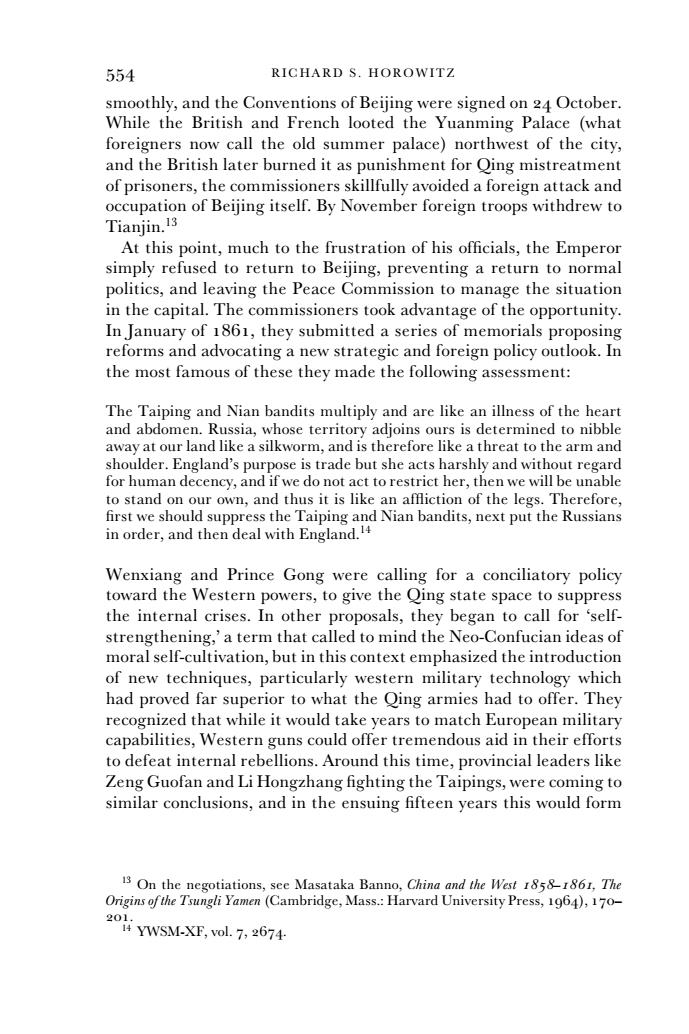正在加载图片...

554 RICHARD S.HOROWITZ smoothly,and the Conventions of Beijing were signed on 24 October. While the British and French looted the Yuanming Palace (what foreigners now call the old summer palace)northwest of the city, and the British later burned it as punishment for Qing mistreatment of prisoners,the commissioners skillfully avoided a foreign attack and occupation of Beijing itself.By November foreign troops withdrew to Tianjin.13 At this point,much to the frustration of his officials,the Emperor simply refused to return to Beijing,preventing a return to normal politics,and leaving the Peace Commission to manage the situation in the capital.The commissioners took advantage of the opportunity. In January of 1861,they submitted a series of memorials proposing reforms and advocating a new strategic and foreign policy outlook.In the most famous of these they made the following assessment: The Taiping and Nian bandits multiply and are like an illness of the heart and abdomen.Russia,whose territory adjoins ours is determined to nibble away at our land like a silkworm,and is therefore like a threat to the arm and shoulder.England's purpose is trade but she acts harshly and without regard for human decency,and if we do not act to restrict her,then we will be unable to stand on our own,and thus it is like an affliction of the legs.Therefore, first we should suppress the Taiping and Nian bandits,next put the Russians in order,and then deal with England.14 Wenxiang and Prince Gong were calling for a conciliatory policy toward the Western powers,to give the Qing state space to suppress the internal crises.In other proposals,they began to call for 'self- strengthening,'a term that called to mind the Neo-Confucian ideas of moral self-cultivation,but in this context emphasized the introduction of new techniques,particularly western military technology which had proved far superior to what the Qing armies had to offer.They recognized that while it would take years to match European military capabilities,Western guns could offer tremendous aid in their efforts to defeat internal rebellions.Around this time,provincial leaders like Zeng Guofan and Li Hongzhang fighting the Taipings,were coming to similar conclusions,and in the ensuing fifteen years this would form On the negotiations,see Masataka Banno,China and the West 1858-1861,The Origins of the Tsungli Yamen(Cambridge,Mass.:Harvard University Press,1964),170- 201. 14 YWSM-XF,vol.7,2674554 RICHARD S. HOROWITZ smoothly, and the Conventions of Beijing were signed on 24 October. While the British and French looted the Yuanming Palace (what foreigners now call the old summer palace) northwest of the city, and the British later burned it as punishment for Qing mistreatment of prisoners, the commissioners skillfully avoided a foreign attack and occupation of Beijing itself. By November foreign troops withdrew to Tianjin.13 At this point, much to the frustration of his officials, the Emperor simply refused to return to Beijing, preventing a return to normal politics, and leaving the Peace Commission to manage the situation in the capital. The commissioners took advantage of the opportunity. In January of 1861, they submitted a series of memorials proposing reforms and advocating a new strategic and foreign policy outlook. In the most famous of these they made the following assessment: The Taiping and Nian bandits multiply and are like an illness of the heart and abdomen. Russia, whose territory adjoins ours is determined to nibble away at our land like a silkworm, and is therefore like a threat to the arm and shoulder. England’s purpose is trade but she acts harshly and without regard for human decency, and if we do not act to restrict her, then we will be unable to stand on our own, and thus it is like an affliction of the legs. Therefore, first we should suppress the Taiping and Nian bandits, next put the Russians in order, and then deal with England.14 Wenxiang and Prince Gong were calling for a conciliatory policy toward the Western powers, to give the Qing state space to suppress the internal crises. In other proposals, they began to call for ‘selfstrengthening,’ a term that called to mind the Neo-Confucian ideas of moral self-cultivation, but in this context emphasized the introduction of new techniques, particularly western military technology which had proved far superior to what the Qing armies had to offer. They recognized that while it would take years to match European military capabilities, Western guns could offer tremendous aid in their efforts to defeat internal rebellions. Around this time, provincial leaders like Zeng Guofan and Li Hongzhang fighting the Taipings, were coming to similar conclusions, and in the ensuing fifteen years this would form 13 On the negotiations, see Masataka Banno, China and the West 1858–1861, The Origins of the Tsungli Yamen (Cambridge, Mass.: Harvard University Press, 1964), 170– 201. 14 YWSM-XF, vol. 7, 2674